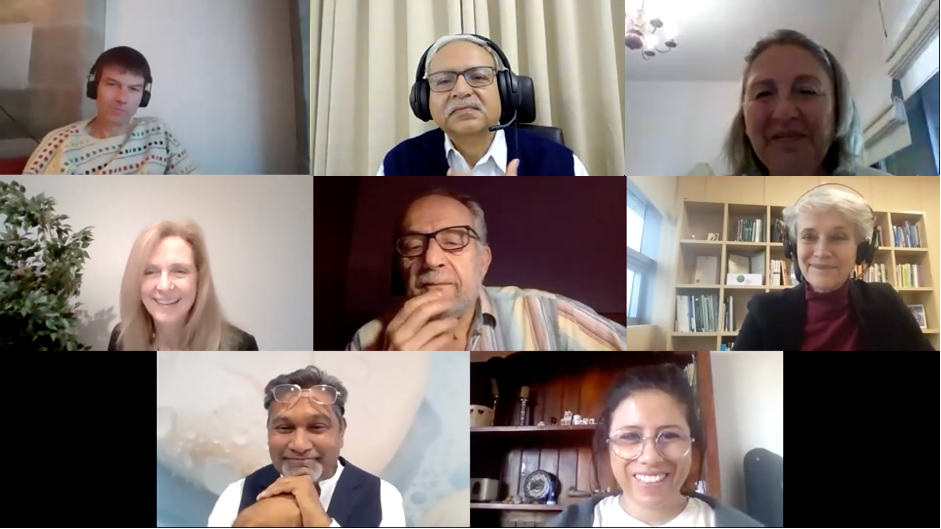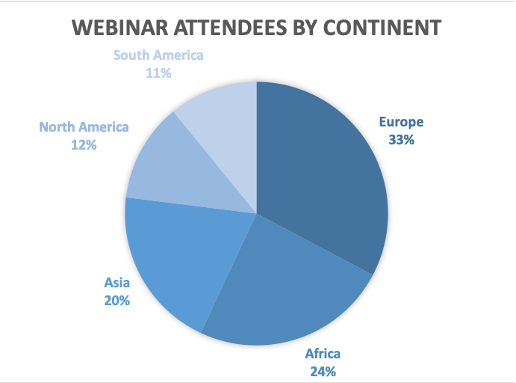
Read more about our panellists here
“There exists a link between the challenge of the compliance of human rights to safe drinking water and the challenge of the sustainability of the aquatic ecosystems”
Special Rapporteur, Pedro Arrojo-Agudo. Pedro began the conversation by introducing the complex relationship between climate adaptation and human rights in a world where 2.2 billion people do not have access to safe drinking water.
Human Right 2 Water’s CEO Amanda Loeffen moderated the event and expressed her concern for the most marginalised communities,
“We must consider the needs of the most vulnerable people in climate adaptation, to realise access to water and good water quality, and to protect their human rights.”
Session 1on ‘Climate Change Tools and Assessments’ set the scene connecting global and regional problems with local solutions, emphasising water governance, and welcomed two experts who are familiar with modelling climate change effects over time.
Roula Majdalani of United Nations Economic and Social Commission for Western Asia (ESCWA) joined from Lebanon. Roula discussed the importance of developing climate change tools to address the question of adaptation, by contextualising it in the water scarce Arab Region.
“Over 74 million people in the Arab region are at a higher risk of contracting COVID-19 owing to a lack of access to basic hand-washing facilities”
Director of the Water and Climate Department at the World Meteorological Organisation Johannes Cullmann pinpointed the need to make the global knowledge and assessments useful at a local level.
“My plea is that we work together to transform all the complicated scientific global findings and awareness to information that people can actually take in.”
Session 2 focused on ‘Climate Change Adaptation Techniques’ by discussing how sustainability, longer term protection of the environment and people’s rights to a healthy life as supported by ample provision of clean and safe water can be achieved if people were to be involved at the community level.
Professor Saleemul Huq, Director of ICCCAD and Professor at the Independent University Bangladesh presented an overview of community-based climate adaptation and an insight into his work with vulnerable communities to build their capacity and adapt to the impacts of climate change. In his presentation, the professor made note of the harsh reality that,
“Countries whose contribution to the global greenhouse emissions are minimal are the countries who are suffering most from the impacts of climate change.”
The Deputy Director for External Affairs at the Green Climate Fund, Ania Grobicki, provided an outline of the work of the Green Climate Fund to provide climate finance for adaptation and mitigation, and then zoomed in to look at how the human right to water can be supported by climate finance.
“Our project in the Comoros works to reinforce the management of water supply to make it more resilient… We hope to create a paradigm shift in policy change and institution building.”
The final session discussed ‘The Human Rights-Based Approach’. The HRBA lends an additional level of rigour to the engagement and participation of the community so that vulnerable people are also included in the solutions. These solutions are inevitably more sustainable as a result, while also protecting human rights – not only the human right to water, but also the right to a healthy environment, a heathy life, and all the other connected rights and SDG goals.
Tunisian Engineer Afef Tlili from Minerva Consulting shared a selection of case studies from the Middle East and North Africa regions showing how the Human Rights-Based Approach can be used in practice, with the derived benefits.
“If we have an injustice of natural resources, it is because we are not listening to the most vulnerable groups.”
The webinar was closed by the President of Human Right 2 Water, and CEO of the Water Research Commission, Dhesigen Naidoo, who has recently been appointed as Member of the Presidential Climate Change Coordinating Commission in South Africa. Closing our webinar, Dhesigen provided an insight into the importance of the Human Rights-Based Approach.
“The whole notion of community participation is absolutely paramount, but it has to be in an empowering way, beyond the lifetime of the project.”

The event attracted an audience of around 180 registrants from all over the globe, including Africa, Asia, and the Americas.
For those of you who were unable to attend, a recording of the webinar is now available.
Our next webinar, in celebration of International Women’s Day, will discuss ‘Women, Water and Human Rights’. The event will be held on the 8th March 2021 with further details to be announced shortly.
Find panellist slide presentations here: Roula Majdalani (UNESCWA), Johannes Cullmann (WMO),Ania Grobicki (Green Climate Fund), Afef Tlili (Minerva Consulting).

